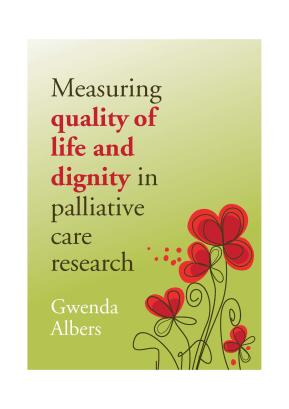Author: Gwenda Albers
Date: 15-10-2012
Promotor: Prof. dr. Luc Deliens and Prof. dr. Bregje Onwuteaka-Philipsen
Co-Promotor: Prof. dr. Roeline Pasman
SUMMARY OF THE DISSERTATION
Background
Palliative care intends to control all aspects of suffering – physical, social, psychosocial and spiritual – for the patient with fatal disease and his family. Palliative care is directed to enhance quality of life and not to prolong life or to hasten death. Because quality of life of the patient is the main focus in palliative care, outcomes of palliative care should assess this quality. In the fall of 2012 a thesis was defended at the Free University in Amsterdam, the Netherlands, which analyses the content and psychometric quality of the instruments used to assess quality of life in palliative care. This thesis investigates which domains should be included in quality of life in palliative care. Since the concept of dignity is also often used in palliative care practice, the study also analyses instruments available to assess dignity.
Methods
The first part of the thesis is a systematic literature review to describe what outcomes studies are available to assess quality of life in long-term care facilities in Europe. In fourteen identified studies quite different instruments were used to assess aspects of quality of life, mostly assessing symptoms and symptom management. Also, it was not clear from the population descriptions to what extent the instruments were focusing on palliative care per se.
Part two starts with an overview of the content and domains measured by the quality of life instruments that are appropriate for use in palliative care. The following domains were identified as relevant for quality of life in palliative care patients: physical comfort, physical functioning, cognitive functioning, psychological, social and spiritual wellbeing and perceived quality of life.
A systematic literature review showed 29 instruments useful to asses quality of life in palliative care, but none of these instruments covered all the domains mentioned above. It was found that although spirituality is considered as an important domain in palliative care it is not well defined in the instruments. The psychometric quality of the 29 instruments were evaluated, showing that each instrument had shortcomings. The best rated instruments were the MQOL, the QUAL-E and the QODD.
In the third part the thesis describes the construct of personal dignity, based on an open ended question about dignity and evaluates the content validity of the Patient Dignity Inventory (PDI). For both studies a large cohort of patients was available. The content of the open question was analyzed and used to assess the relevance of the items of the Patient Dignity Inventory. It is concluded that the PDI can be used in a general population to obtain insight into people’s thoughts about what would constitute dignity in the last phase of their life. However, certain aspects like communication and care need more attention in the PDI when it will be used in palliative care settings. Personal dignity at the end of life showed to be related with sociodemographic
characteristics and subjective health, i.e. certain aspects get more emphasis than others. The presence of illness did not change personal dignity. The Patient Dignity Inventory was also investigated among caregivers (physicians, acting as end-of-life consultants and volunteers, trained in palliative care), asking them which aspects are – in their opinion – influencing dignity in terminally ill patients. The physicians considered the physical aspects of suffering as most influential and problematic in practice for dignity; the volunteers mentioned psychosocial aspects as most important.
Conclusions
This study concluded that the concept and assessment of quality of life in palliative care needs improvement. The researcher recommended that the evaluation of existing instruments with good content validity should have priority over the development of new instruments. Such evaluation and improvements of existing instruments as well as the implementation of the improved instruments in practice should be a task for European professional organizations. Also, the concept of personal dignity should be an important outcome measure in palliative care. It is interesting to note that the meaning of dignity in this study stayed ‘stable’ regardless the health status of the respondent; this might be an argument to start palliative care planning with the patient in an early stage. Another finding to be kept in mind is that physicians, involved in palliative care, see physical suffering as the main ‘threat’ for dignity, which is not shared by the patients.

